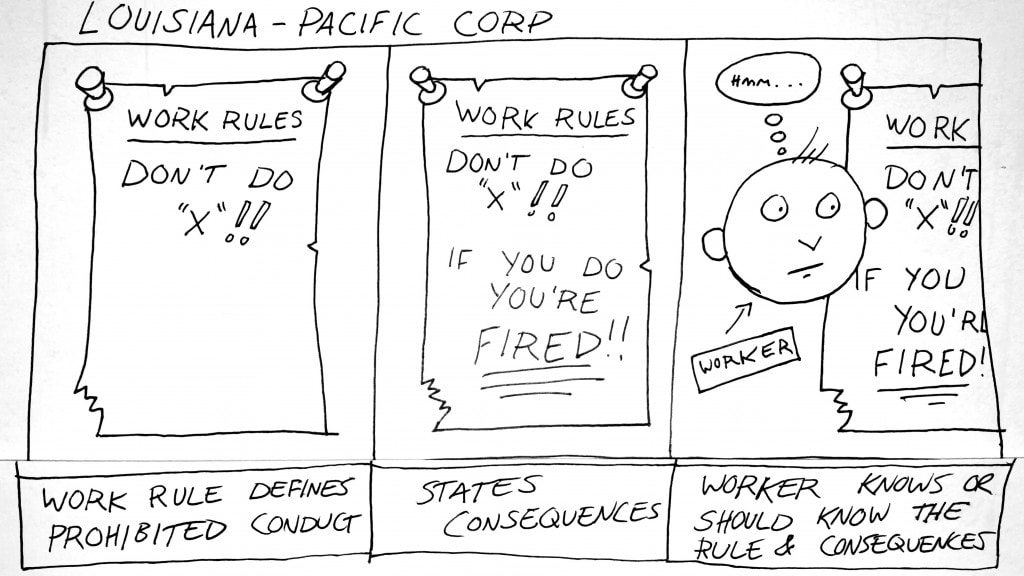Don’t Voluntary Abandon Your Job!
In Ohio Workers’ Compensation, you might hear the word “abandonment” in regards to your job. Abandonment refers to the departure from your job. If you abandon your job you are no longer working there. It is roughly analogous to quitting your job, being fired/terminated, or laid off from your job. What the injured worker needs to be concerned with is whether that “abandonment” was voluntary or involuntary.
In the workers’ comp world, voluntary abandonment can be a bar to the receipt of temporary total compensation; involuntary abandonment is not. There are a few primary ways to voluntarily abandon the workplace: retirement, incarceration, and violation of a written work rule. In this article I will be focusing on the “violation of a written work rule.”
Voluntary Abandonment: Workplace Rule Violation
The “violation of a written work rule” precedent was first set out in the Ohio Supreme Court Case, Louisiana-Pacific Corp. The Court stated that a termination of an employee was “voluntary” where a written work rule or policy:
- clearly defined the prohibited conduct;
- had been previously identified by the employer as a dis chargeable offense; and
- was known or should have been known to the employee.

A rule doesn’t make sense unless you can see it in action. In Louisiana-Pacific there was a written work rule that stated an employee could not be absent for more than three consecutive days without notifying a manager. Presumably after recovering from his work injury, the worker was released to work on December 17, 1990. The worker did not show up for work for three days, the 17th through the 19th . The worker did not call his manager until after the New Year. The employee was terminated. Since the termination stemmed from the violation of a written work rule, the employee was deemed to have “voluntarily” abandoned his job and thus was not entitled to temporary total compensation.
“Hold on, they can fire me for a violating a work rule that led to my injury?”
No. According to State ex. Rel. Gross the workplace rule doctrine is not meant conduct that occurs at the same time as the injury. In Gross, a worker was injured while using a deep fryer while working at KFC in an improper manner in violation of a workplace safety rule. So let us apply the three-part test in Louisiana-Pacific to Gross’ facts. (1) There was clearly defined prohibited conduct, it was written or posted somewhere in KFC; (2) presumably it was also written that violation of a workplace rule was a dis chargeable ( i.e. grounds for termination/being fired) offense; and (3) the worker explicitly knew about the rule because he had been verbally warned on multiple prior occasions on the proper use of the deep fryer.
So what’s different from Louisiana-Pacific in Gross. Well KFC terminated the worker and they based premised the termination on the fact that the worker had improperly used the deep fryer in contravention of the workplace safety rule at the time he was injured. So it’s a timing thing. KFC could have fired him before he got injured for improperly using the deep fryer.KFC could have fired him after he returned to the job if he improperly used the deep fryer again. But they could not have fired him for improperly using the fire at the same time he was injured. And they could not have fired him after he was injured, for improperly using the deep fryer in the past.
The Supreme Court stated that to do otherwise would inject fault into the workers’ comp system. That is, an injured worker would not be entitled to compensation if he partially or wholly caused his work injury. The Supreme Court’s rationale makes sense to me.
Conclusion
This workplace rule violation is just one way to voluntarily abandon the workplace. I’ve simply scratched the surface on the voluntary abandonment issue. This area is pretty nuanced. However even if a worker is deemed to have voluntarily abandoned his job there is a second part of the analysis to determine whether the worker is entitled to temporary total compensation. I will address that in the next article.
Btw is anyone else scared of deep fryers? I worked in the cafeteria of my resident hall while I was at Purdue University. Occasionally I would be assigned to the deep fryer. This involved dipping French fries, or chicken or whatever happened to be on the menu that night into the boiling hot oil. Part of my duties at the end of the evening was draining the boiling oil into a bucket. I was always afraid I was going to trip or place my foot into that hot oil. Yikes!
